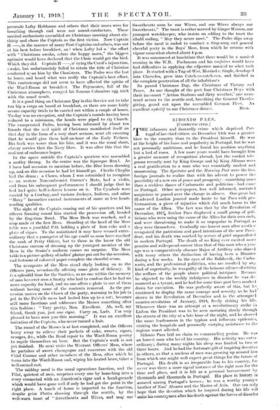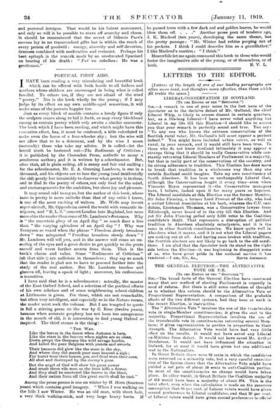SIDONIO PARS.
[COMMUNICATED.]
HE infamous and dastardly crime whieh deprived Por- i tugal of her chief citizen on December 14th was a greater blow to the country than to the President himself. He was at the height of his bone and popularity in Portugal, but he was not personally ambitious, and ho found his position any-thing but a bed of roses. A few more years would have brought him a greater measure of recognition abroad, but the cordial tele. grams recently sent by King George and by King Alfonso wear a real gratification to a man who was essentially modest and unassuming. The Spectator and the Morning Poet were the first foreign journals to realize that with his advent to power th possibility of a new era of peace and proaperity—sometbing sours than a reckless dance of Carhonario and politician—had corn e to Portugal. Other newspapers less well informed, nurture 1 suspicions or passed over the change in silence. One great hut ill-advised London journal made haste to tar Pare with pin- Germanism, a piece of injustice which did much harm to the cause of the Allies. The fact was that by the Revolution of December, 1917,, Senhor Pare displaced a assail group of poli- ticians who were using the cause of the Allies for their own ends. and were threatening to make it as unpopular in Portugal as they were themselvea. Gradually one honest malt after another recognized the patriotism and good intentions of the new Presi- dent, and his death was marked by scenes of grief unparallelel in modern Portugal. The death of no Kin ever excited more genuine and widespread sorrow than that of this man who a year ago was a comparatively obscure Major of Artillery who shared with many others the distinction of having been a Minister during a few weeks. In the eyes of the Bolshevik, the Carbo- nario, and the professional politician, who are insulted by any kind of superiority, he was guilty of the heinous offence of setting the welfare of the people above political intrigues. Because he objected to the weekly indulgence in disorder he was de- nounced as a tyrant, and he had for some time past been marke down for execution. Ile was perfectly aware of this, but Its continued to display the same courage and serenity as he had. shown in the Revolution of December and in tho attempted counter-revolution of January, 1918, freely risking Iris life. . Whenever there was an attempt at a revolutionary strike in Lisbon the President was to be seen motoring slowly through the streets of the city at a late hour of the night, and he R110Wel the same fearlesaness in the typhus and influenza epidemics. visiting the hospitals and personally carrying assistance to tins regions worst affected.
Sidonio Pates laid no claim to commanding genius. He was an honest man who loved his country. His activity was extra- ordiaary ; during many nights his sleep was limited to two or three hours. And he had the fortunate gift of inspiring devotion in others, so that a nucleus of men was growing up around him from which one might well expect great things for the future of Portugal. His death is an irreparable loss to his country, for never was there a more signal instance of the right man for the time and place, and it is felt as a personal bereavement fry thousands anti thousands in Portugal. His place in history is assured among Portugal's herons'. he was a worthy younger brother of Nun' Alvarez and the Master of Avis. One can only hope that the devotion which he inspired during his life will unite his countrymen after his death against the forces of disorder
and personal intrigue. That would he his fairest monument, and only so will it be possible to stave off anarchy and chaos. It should be remembered that the secret of Sidonio Paes's euccess lay in no transcendent gifts but is within the reach of every person of goodwill energy, sincerity and self-devotion, firmness combined with moderation and restraint. Perhaps his best epitaph is the remark made by an uneducated Spaniard on hearing of his death : "Fed an caballero : He was a gentleman."



































 Previous page
Previous page